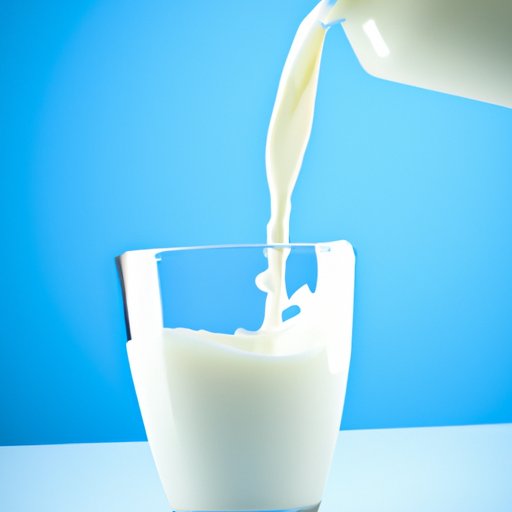Introduction
Milk has been consumed for centuries, as it is an important source of nutrition for both humans and animals. But with the rise of alternative milks and the conflicting messages about the health benefits of dairy products, it can be difficult to know whether milk is actually healthy. In this article, we will explore the pros and cons of milk consumption, examine the myths and facts surrounding dairy health benefits, investigate the nutritional value of different types of milk, and assess the impact of milk on overall health and wellbeing.

Evaluating the Pros and Cons of Milk Consumption
When considering the pros and cons of milk consumption, there are some key points to consider. On the one hand, milk is a rich source of several essential nutrients, including protein, calcium, phosphorus, and vitamin D. It is also relatively affordable, widely available, and easy to incorporate into meals and snacks. On the other hand, milk can contain added sugars and fat, which can increase the calorie content of foods and contribute to weight gain. Additionally, milk may cause digestive discomfort in some people, leading to bloating, gas, and diarrhea.

Exploring the Myths and Facts Surrounding Dairy Health Benefits
There are many myths and misconceptions surrounding the health benefits of dairy products. For example, some people believe that milk increases mucus production and causes allergies, but there is no scientific evidence to support this claim. Other common myths include the idea that milk is bad for bones or that dairy is linked to an increased risk of certain cancers. However, research indicates that dairy consumption may actually provide numerous health benefits, such as improved bone health, reduced risk of obesity, and protection against certain types of cancer.

Examining the Nutritional Value of Different Types of Milk
When it comes to milk, there are a variety of options available, including cow’s milk, almond milk, oat milk, and soy milk. Cow’s milk is a good source of protein, calcium, phosphorus, and vitamin D, while plant-based milks are generally lower in calories and saturated fat. Additionally, plant-based milks are often fortified with vitamins and minerals, making them a good choice for those following a vegan diet.
Investigating the Role of Dairy in a Healthy Diet
The recommended intake of dairy products varies by age and gender, but the general recommendation is that adults should consume 2-3 servings of dairy per day. Additionally, it is important to choose low-fat or non-fat varieties of milk, yogurt, and cheese when possible, as these are lower in calories and saturated fat. For those who cannot or choose not to consume dairy, there are a variety of substitutes available, such as fortified plant-based milks, tofu, and nut butters.
Assessing the Impact of Milk on Overall Health and Wellbeing
Numerous studies have examined the potential links between dairy consumption and various health outcomes. A recent review of 28 studies found that regular dairy consumption was associated with a reduced risk of cardiovascular disease, type 2 diabetes, and stroke. Additionally, evidence suggests that consuming dairy products may reduce the risk of certain types of cancer, although more research is needed to confirm this link.
Conclusion
In conclusion, milk can be a nutritious part of a healthy diet, providing essential nutrients such as protein, calcium, phosphorus, and vitamin D. While there are some potential drawbacks to milk consumption, such as added sugars and fats, the evidence suggests that it can offer numerous health benefits, including improved bone health, reduced risk of obesity, and protection against certain types of cancer. As always, it is important to choose low-fat or non-fat varieties of dairy products when possible and to limit intake to 2-3 servings per day.
Overall, there is no definitive answer as to whether milk is healthy or not, as it depends on individual circumstances and preferences. However, with the right information and careful consideration of one’s own needs and dietary goals, it is possible to determine whether milk is the best choice for a healthy diet.
(Note: Is this article not meeting your expectations? Do you have knowledge or insights to share? Unlock new opportunities and expand your reach by joining our authors team. Click Registration to join us and share your expertise with our readers.)
